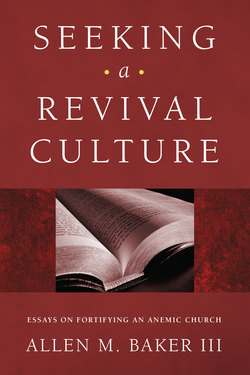Читать книгу Seeking a Revival Culture - Allen M. Baker - Страница 10
На сайте Литреса книга снята с продажи.
Abundance
Оглавление. . . which He lavished upon us in all wisdom and insight.
Ephesians 1:8
Robert Lewis Dabney was born in rural Virginia in 1820, and though he was not wealthy, he nonetheless was reared with a notion of the Old South aristocracy. As a young man he came to faith in the Lord Jesus Christ and attended Hamden Sydney College near Farmville, VA. Later, he received a seminary education at Union Theological Seminary, a Presbyterian Seminary near the Hamden Sydney campus. R. L. Dabney became the pastor of a small Presbyterian Church in Tinkling Spring, Virginia and saw a mighty revival sweep through his church and town, drawing a large number of people into Christ’s kingdom. After a few years there, he became a professor of theology at Union Seminary and served as an officer for Thomas J. “Stonewall” Jackson during the War Between the States. The Confederacy’s loss of that war devastated Dabney, and he had a very difficult time reconciling what he saw as the loss of Southern culture and theology in post-war years. Dabney was a wonderful theologian. In fact he wrote various essays that have come to sound quite prophetic in the late twentieth century and early twenty-first century. His essay on public education in the 1880’s, where he predicted that public education would sooner or later forbid prayer and Bible reading in such schools, is a strong case in point.1
While Dabney was a great theologian, he had one glaring weakness. Sean Lucas of Covenant Seminary, in his biography on Dabney,2 confirms what many have long suspected. Dabney was a racial bigot. To be sure, we ought to “cut him some slack” on the issue, realizing that most nineteenth century people, in both the North and South, viewed black people as inferior; but there is no skirting the issue. In the post-war years Dabney’s bitterness over the loss of Southern culture and aristocracy seemed to cut him off from the mainstream of theological discourse. The impact Dabney could have had was severely blunted by his anger, resentment, and bitterness over race and culture.
Interesting story, you may say, but what’s the point? Here it is—if R. L. Dabney, one of our greatest theologians and a man of holiness and godliness, a man who knew well the doctrines of grace, could fall into such bitterness and resentment, then how much more so is that possible for you and me?
The Apostle Paul in Ephesians 1:7 has proclaimed the marvelous truth that in Christ we have redemption through His blood, the taking away of our trespasses according to the riches of His grace. Paul builds on that glorious proclamation by adding two phrases in verse 8—“which God lavished upon us in all wisdom and insight.” Literally this grace He super abounded to us. It is an over abundance, overwhelming, over-the-top undeserved favor by God through the Lord Jesus Christ. The second phrase has to do with God super abounding this grace in all wisdom and insight. Conservative biblical commentators are divided on where to put this phrase.3 Does it make more sense with “which He lavished upon us” or does it go better with verse 9, “He made known to us.” It seems option one is best, for it is a foregone conclusion that God has all wisdom and insight. We don’t need to be told that. Rather this grace that super abounded to us gives us wisdom and insight, knowledge with application, the ability to work out the knowledge of God we possess.
At least it ought to do so. Dabney knew very well the riches of God’s grace. He taught and believed the doctrines of election, predestination, adoption, and redemption. He championed such doctrines. But there was this one area of his life where he failed to apply what he knew. He could have used more wisdom and insight.
How, in your own life, are you like R. L. Dabney? You know theologically and biblically the riches of God’s grace to you, but perhaps you are filled with racial pride or bigotry. Maybe you look with disgust on the immigrants in your community. Maybe you hold in contempt those of the hip hop culture. I am not saying that you must celebrate their culture. I am simply asking, are you bigoted? Are you a racist? And then we can move onto other issues. Is your life characterized by fear of people, anger or bitterness, worry? Are you slowly finding yourself put to the side because people simply do not enjoy being around you?
May God show you the blind spots in your own life! Yes, we rejoice over the super- abundant, over-the-top-grace but will you ask God to give you the wisdom and insight to more readily and practically apply what you already know? This wisdom and insight is the essence of the revival culture we so desperately need.
1. Dabney, On Secular Education.
2. Lucas, Robert Lewis Dabney: A Southern Presbyterian Life.
3. For more on this debate see John Calvin, William Hendriksen, R.C.H. Lenski, and Peter O’Brien in their excellent Commentaries on Paul’s Epistle to the Ephesians.
